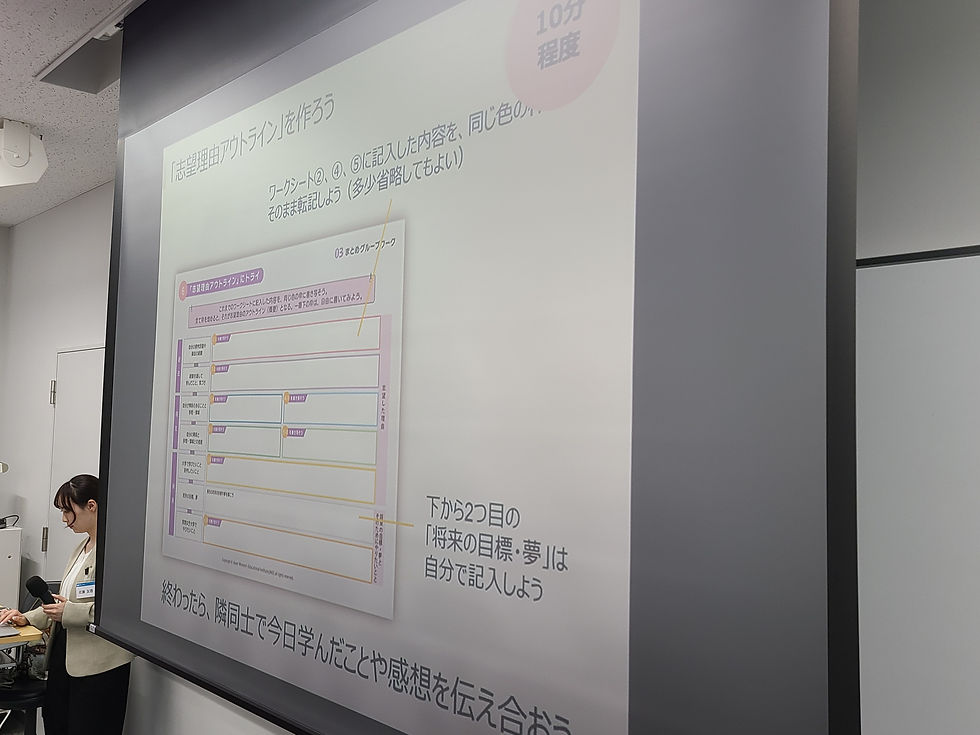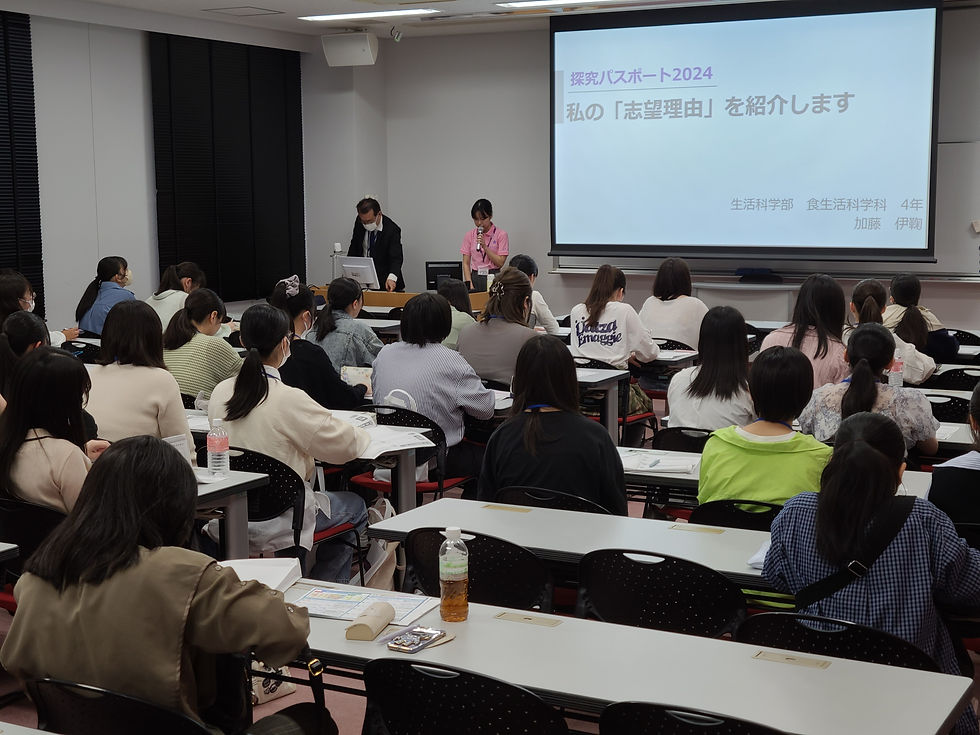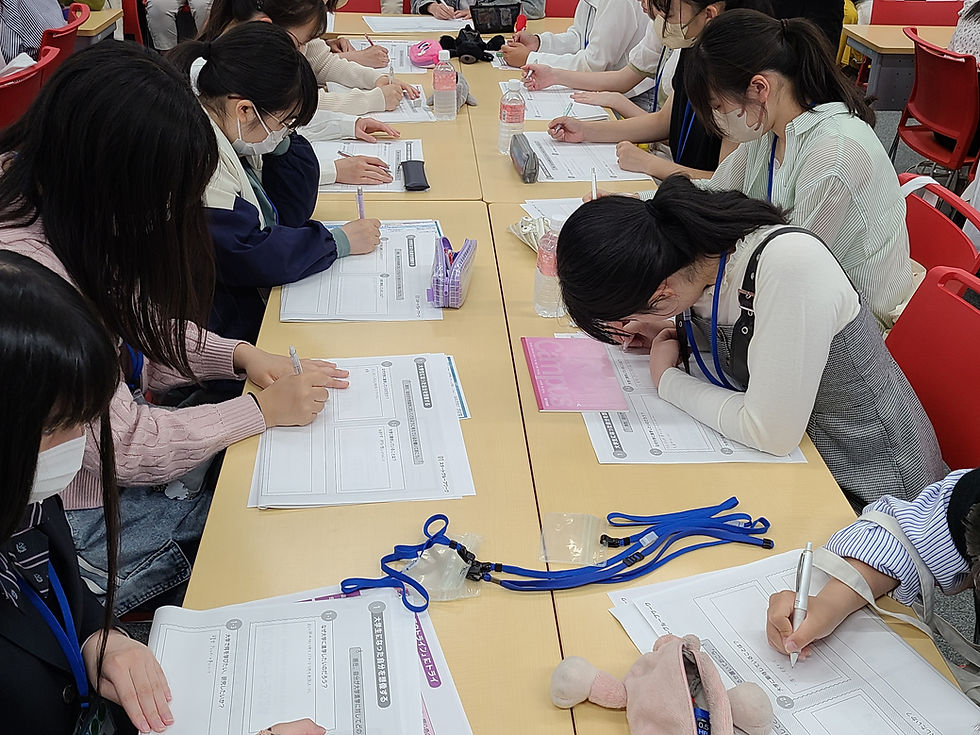Agency Education in Japan #3: Tankyu Passport
- Manami Okuda Wada
- Jul 3, 2024
- 4 min read
Updated: Jul 12, 2024
Do you remember the excitement of visiting your dream school for the first time? Walking through the main gate, feeling the thrill of stepping onto the campus, and sitting in a lecture hall surrounded by peers—it’s an exhilarating experience. But amidst this excitement, a question often arises: "Do I really belong here?"
Finding the right match between higher education institutions and prospective students is crucial. Except for some highly competitive universities, admissions departments strive to make students feel welcome and motivated to apply. In Japan, many universities host "open campus" events, or campus tours, to showcase their learning environments to high school students.
Jissen Women's University, in partnership with Tomonokai Co. Ltd., has taken this concept a step further with the "Tankyu Passport" event. "Tankyu," meaning inquiry-based learning in Japanese, is designed to give high school students a deeper insight into university life. This initiative not only familiarizes them with the academic offerings and campus atmosphere but also motivates them to delve into their individual objectives and ambitions. Through the "Tankyu Passport", students are empowered to identify their aspirations for their university journey, thereby ensuring a more purposeful transition to higher education that resonates with their aspirations.
***
"Tankyu Passport" is simple in structure but involves significant effort. Jissen Women's University provides lectures from professors, aimed at helping students gain insight into the different fields of study available at the institution. But "Tankyu Passport" goes beyond mere lectures. The event assists students in articulating their personal statements before the lectures and encourages them to reflect on their learning afterward.
Jissen Women's University not only conducts entrance exams in the traditional format but also employs a comprehensive selection process similar to that used by American universities. This strategy, which takes into account various aspects of a student's profile, has been successful in identifying talented individuals who might otherwise go unnoticed. "Tankyu Passport" fulfills a dual role in running the comprehensive selection process effectively, despite the effort involved. It not only assists students in clarifying their reasons for wanting to attend the university but also offers the university an opportunity to support students throughout the application process. Through these means, the university aims to increase both the number and diversity of applicants, thereby enriching the academic community.
***
On the day of the "Tankyu Passport" event, Kazuyuki Kisohara, Executive Officer and Head of the Future Education Creation Department at Tomonokai Co., Ltd., commenced the program with a presentation on current trends in university admissions and the key factors that universities take into account when reviewing applications. Throughout the session, students delved into their history (achievements), their present situation (reasons for their enthusiasm to attend a specific university and pursue a particular major), and their future aspirations (goals for their time at university and post-graduation). Prospective students dedicated time to develop "personal statement outlines" that will serve as a roadmap when they write their actual personal statements in the autumn. An important aspect of creating this outline is that current university student mentors are available in the classroom to offer brief assistance. On this day, a university student mentor also circulated the classroom, providing encouragement and support to a prospective student specifically passionate about ancient Japanese art.

After drafting the "personal statement outlines", prospective students selected two informational lectures to join. The university student mentor followed the girl passionate about ancient Japanese art into the classrooms on design psychology and aesthetics & art history. At the beginning of each lecture, a current student made a presentation about how she wrote her personal statement, using a uniform framework of "main point, reason, and future aspirations". Subsequently, the professors provided an overview of the course content and showcased ongoing projects by current students. The aesthetics and art history professor even outlined the characteristics of a prospective student that would align well with the department. It was evident that this description perfectly matched the interests of the girl, who was passionate about ancient Japanese art.

Upon returning to their original classrooms, the students reviewed their outlines. This allowed them to better visualize their educational goals, aspirations at Jissen Women's University, and post-graduation ambitions. Once again, current university student mentors joined to assist students in reflecting on the lecture experience. The university student mentor inquired about the girl's thoughts on the lectures, and she expressed interest in the aesthetics and art history department. The mentor suggested that she speak with the current student presenter for more insights. Following the event, the girl engaged in a conversation with the current student to clarify her image in the specific department. By incorporating her interests into her university experience, discovering a connection during lectures, and finding the courage to talk to her ideal senior, she empowered herself to make informed decisions about her future pathways.

"Tankyu Passport" is a unique project that aligns the needs and aspirations of high school students with the academic strengths of various universities. Many university student mentors involved in the program have mentioned that they wished such a program had been available during their high school years. Looking ahead, Kazuyuki Kisohara commented, "In our increasingly complex society, it's essential that Japan's educational reforms focus not only on getting students into college but also on helping them pursue their passions afterward. We will keep exploring partnerships with various universities and businesses to ensure that the concept of 'inquiry,' which is now becoming a part of Japanese education, helps each student make meaningful and determined choices for their future."
More information about Tankyu Passport available on the Japanese news page
More information on Jissen Women's University available in English on the homepage


Comments